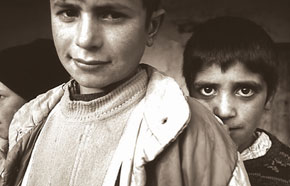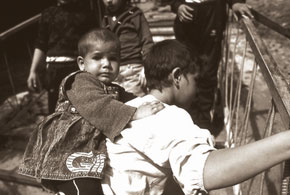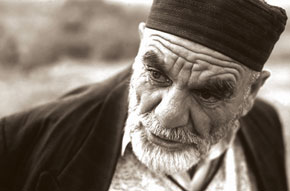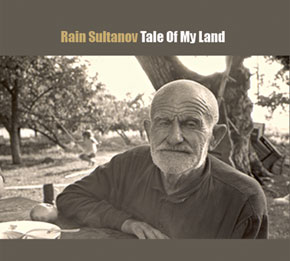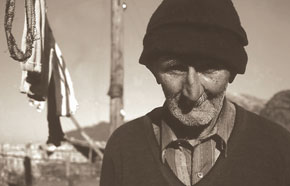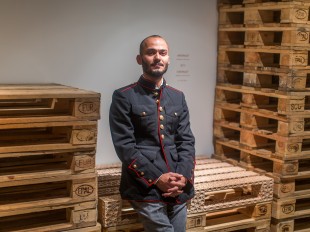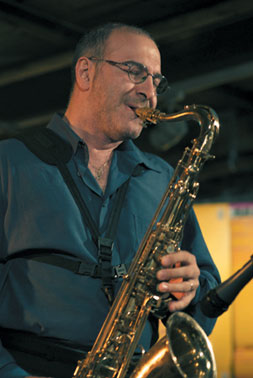 Pages 84-87
Pages 84-87by Ian Peart & Saadat Ibrahimova
Mid April 2005, Baku Jazz Festival, saxophonist Rain Sultanov assembles a septet of mainly local musicians, but including renowned Indian tabla player, Udai Mazumdar; they play two new compositions Father´s Tale and Tale of My Land.
Mid February 2006, evening, after a short break four men walk back to their stools, each surrounded by the partition screens of a recording studio. The oud player rubs his hands, trying to warm them, while another sets up a backing motif on the keyboard. The naghara player slaps down a counterpoint rhythm and the oud plucks out a throaty, running solo until the saxophone breezes in to set off a musical debate, questioning, demanding and falling back to ponder the oud´s response. After half an hour they stop to take stock,
"Play less, say more..."
The week before, they had begun the first session by looking at a series of photographs taken around the country, focusing especially on the elderly and the young of Azerbaijan. An old man sits at a table in a garden; there´s a child behind him on a swing slung wide between trees. "We live in the present, but never forget the past and we want our children (the future) to be happy.... We see sadness in the old man´s face, but also a smile - the na?ve smile of a child - optimism for the future."
"When we play, imagine those faces - old and young."
28th October 2008, more than three years after the initial airing, Rain Sultanov finally goes to a full house in the Jazz Centre in Baku to present his latest project, Tale of My Land. His own music on CD is accompanied by photographs and text and a DVD with a film clip and commentary in three languages; it is his most ambitious to date and demanded his strongest commitment, "It is a serious project - musicians should carry their share of responsibility."
Many people are still living in difficult conditions and many others are in no position to help them materially, but, "I hope the music will help change people´s opinions and treatment of each other - especially the older and the younger generations."
Sultanov has always been known as a jazz musician in Baku; he was a member of Rafiq Babayev´s group - the pioneering jazzman so tragically cut down by a metro bomb explosion in 1994. Rain has also contributed much to the local jazz scene: indeed he ran the Jazz Centre until last year and reinstated the tradition of locally organized Jazz Festivals, bringing some of the world´s finest musicians to the city. He was awarded the title Honoured Artist by President Ilham Aliyev for his services to Azerbaijani jazz music.
Tale of My Land, however, is not so easy to classify. Listen to it and you will hear the cello, usually associated with classical music, as an intriguing counterpart to the saxophone. The oud is a lute of Arabic origin, the harp is not notably a jazz instrument and neither is the naghara, a kind of tom-tom drum more commonly used in Azerbaijan´s mugham and folk music. The idea of combining voices and media upon a homeland base seems to follow an established progression in Sultanov´s work. This is actually his ninth CD project - he has produced classical and folk albums for other musicians as well as compiling Azerbaijani jazz music of the past, including an anthology tracing its development. Three previous albums featuring his own music: Last Moment, performed by Syndicate (a group made up of Rain, his two, bass and drum-playing, brothers and pianist Eldar Rzakulizada), Mugham-Megham and City of Jazz all had their roots in jazz-influenced rhythms of the land, but with an expanding range of other voices. The music itself is developing a broader significance. This is a time when Azerbaijan is finally reaping the rewards of its hard labour through the years of post-Soviet independence. It seems natural that a musician so conscious of the life around him should use his music to express love and gratitude to the generation who have borne the brunt of the struggle. Coupled with this is his desire, as a father, to see that all of the rising generation are given every chance to make their contribution to a brighter future. Thus Farid Ashrafoghlu´s affecting photographs and a video journey taken by a young boy are included to reinforce the ideas of a musical conscience. The use of this wider range of media reflects Sultanov´s concern for the cultural future of his country. The recent death of the great singer Muslum Maqomayev (see pages …) brought home, for him, the gap between popular and populist culture: "Just for two days they showed really good programmes on television - there are so many good things in the archives - why not use television to get people used to quality? It can improve people and their culture. Children need to have their interest stimulated if they are to take to and learn, for example, good classical music."
Such an all-consuming project is sure to involve the family; as mentioned, Rain´s children were part of the original stimulus and his wife, Leyla Afandiyeva, a talented designer, has contributed to much of her husband´s work. The design process this time was based on a combination of the music and the original theme: "It all starts from the music. I listen to it, give my ideas to Rain and we discuss it. Of course, we sometimes have to find a way to agree!" As she says on the DVD, "I based the design for this album on the grey-brown colour suggested by its title.... We used photographs of children and elderly people. I really wanted the focus to be on the eyes...."
The project as a whole was a long time in gestation and the DVD itself had no easy birth - false starts in Turkey were eventually solved when local film director Elchin Musaoghlu stepped in to assist. The machinery making the album cover broke down.... and Rain confesses, "Everything was difficult - this one more difficult than the others."
And although 28 October was "a real celebration - it was complete", this was not strictly true. A few days later the instigator, composer, producer, fund-raiser and, yes, saxophonist was in a local shop publicising the album and handing out free copies. A month later he was at the University of Culture and Art to see the project introduced to fascinated students - the English version also contributing to their language training. There may well be more such presentations as he seeks to spark wider interest in the music and the culture.
There will certainly be more projects. Earlier this year Rain was in Norway to play two concerts with pianist Isfar Sarabski, another of Azerbaijan´s rising stars; they were recorded and a live CD is a distinct possibility. The link to Norway was, as ever, StatoilHydro, the company a longstanding supporter of Azerbaijani culture - and one of those who made Tale of My Land possible by sponsorship, through Baiba Anda Rubesa. Nuri Ahmadov, of Azeurotel, and Samir Mammadov, of the Digital Services Company, were the other invaluable mainstays in this respect; another Azerbaijan-based Norwegian, Thor Jorgen Skjelbred, was co-producer. There are at least two other projects on the horizon, both of them placing Azerbaijan in an international context and seeking mutual cultural enrichment.
At the launch in October there was no live performance. The music is not intended to be background to the chink of glasses and jingle of mobile tones - it is intended for listening and thought. It is well worth your effort, and Rain Sultanov´s, so let him regale you with the Tale of My Land.
